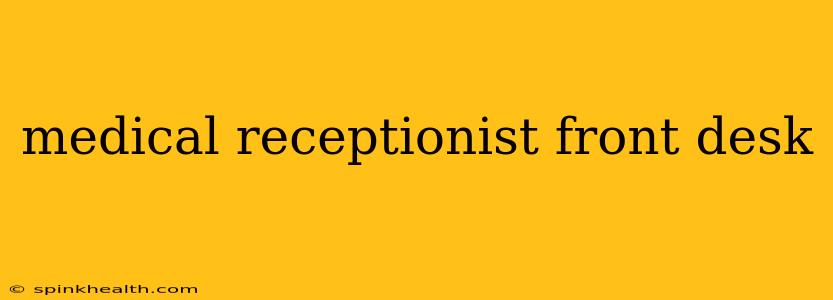The bustling atmosphere of a medical clinic is a symphony of activity, a carefully orchestrated dance between doctors, nurses, and patients. But at the heart of this orchestrated chaos, quietly directing the flow, is the medical receptionist – the unsung hero of healthcare. Their role extends far beyond simply answering phones; it's a multifaceted position demanding a unique blend of skills and unwavering dedication. Let's delve into a typical day, revealing the many hats this essential role requires.
What Does a Medical Receptionist Do?
Imagine walking into a doctor's office. The first friendly face you see, the calming voice guiding you through the process, the efficient hand scheduling your appointment – that's the medical receptionist in action. They are the first point of contact, setting the tone for the entire patient experience. Their responsibilities are diverse and demanding, encompassing:
- Scheduling appointments: Juggling multiple doctor schedules, accommodating patient preferences, and ensuring efficient clinic flow is a daily challenge.
- Answering phones: Providing immediate assistance to callers, directing inquiries, and taking detailed messages requires patience, precision, and a calm demeanor.
- Managing patient records: Maintaining accurate and up-to-date patient files is crucial for continuity of care, and often involves electronic health record (EHR) systems.
- Handling billing and insurance: Processing claims, verifying insurance coverage, and explaining billing procedures demands financial acumen and excellent communication.
- Greeting patients: Creating a welcoming and comfortable environment for patients starts with a warm smile and efficient check-in process.
What Skills Do Medical Receptionists Need?
This isn't just about being friendly; it demands a robust skillset. The ideal candidate possesses:
- Exceptional communication skills: Clear, concise, and empathetic communication is key, both verbally and in writing.
- Strong organizational and time management skills: Multitasking is paramount, requiring the ability to prioritize tasks and meet deadlines amidst interruptions.
- Proficiency in medical terminology: Understanding medical language is essential for accurate record-keeping and communication with healthcare professionals.
- Computer literacy: Fluency in EHR systems and other medical software is crucial for efficient workflow.
- Attention to detail: Accuracy in data entry and record-keeping is non-negotiable.
What Education and Training Are Required to Become a Medical Receptionist?
While a high school diploma or equivalent is usually sufficient, additional training or certification can enhance your career prospects. Many vocational schools and community colleges offer medical assisting programs that encompass receptionist duties, providing a strong foundation.
What are the career advancement opportunities for medical receptionists?
The path doesn't end at the front desk. Experienced medical receptionists can advance to roles such as:
- Medical Office Manager: Overseeing the administrative functions of a medical practice.
- Medical Billing and Coding Specialist: Focusing on the financial aspects of healthcare.
- Practice Administrator: Managing the overall operations of a clinic or hospital.
How Much Do Medical Receptionists Make?
Salaries vary depending on location, experience, and employer. Research specific salary ranges in your region for a more accurate estimate.
What is the work environment like for a medical receptionist?
The work environment is typically fast-paced and demanding. The ability to remain calm under pressure, and efficiently manage tasks is crucial for success.
What are the day-to-day challenges faced by medical receptionists?
Balancing multiple tasks simultaneously, managing patient expectations, and dealing with challenging situations (e.g., upset patients, insurance issues) are everyday challenges. Strong problem-solving and conflict-resolution skills are invaluable.
The medical receptionist is more than just a receptionist; they are a critical link in the chain of patient care. Their dedication, skills, and commitment ensure smooth clinic operations and contribute significantly to a positive patient experience. They are the unsung heroes, the quiet guardians of the healthcare system's front lines.

